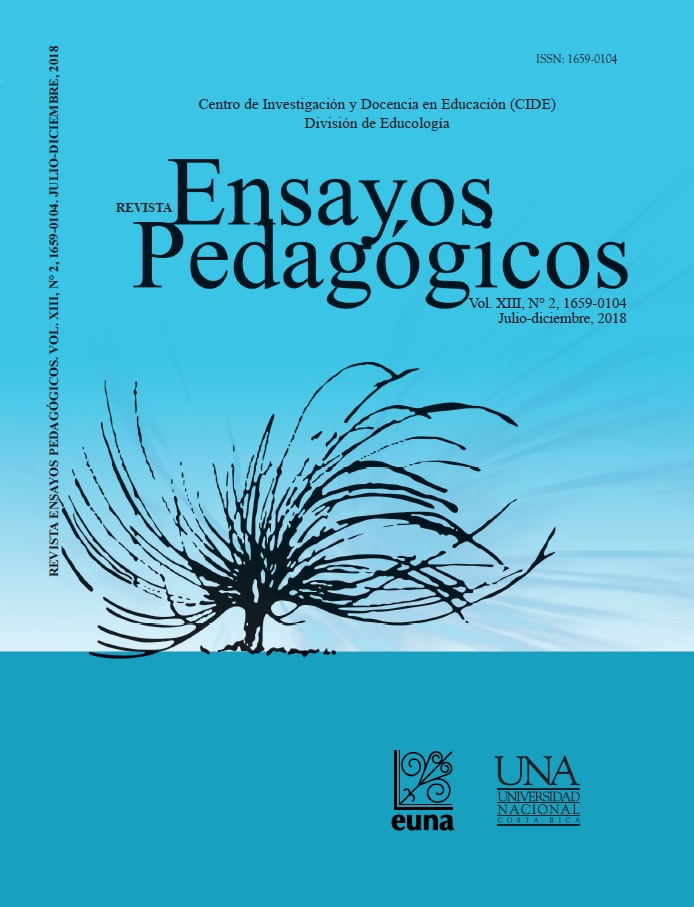Criticism to Human Capital Theory, Education and Socioeconomic Development
DOI:
https://doi.org/10.15359/rep.13-2.7Keywords:
human work, poverty, market economy, social inclusionAbstract
This article aims to critique the concept of human capital. To the extent that a society does not accommodate all the people who comprise it for full enjoyment (health, work, education, culture, housing, recreation, among others), to that extent human work loses its capacity for social transformation. In this line of thought, the concept of human capital becomes an economic category that disguises the contradictions of existing social classes, to separate the subject from work itself. By eliminating the subjectivity of work, class contradictions are eliminated. The construction of a society in which all fit and all goes through work; in other words, there could not be no work without subject and subject without work.
References
Abad, C. (1996). Crecimiento económico y desarrollo a largo plazo: A la búsqueda de un nuevo consenso. Pensamiento Iberoamericano. Revista de Economía Política, 29, 11-25.
Arezki, R. y Quintyn, M. (2013). Grados de desarrollo: Nuevos datos sugieren que la economía funciona mejor cuanto mayor es el nivel educativo de sus empleados públicos. Finanzas y Desarrollo. Fondo Monetario Internacional.
Azqueta, D., Gavaldón, G. y Margalef, L. (2007). Educación y desarrollo: ¿Capital humano o capital social? Revista de Educación, 344, 265-283.
Barro, R. (1991). Economic growth in a cross section of countries. Quaterly Journal of Economics, 106(2), 407-443.
Barro, R. (1996A). Health and economic growth. Cambridge, MA: Harvard University.
Barro, R. (1996B). Determinants of economic growth: a cross-country empirical study. NBE Working paper series. Cambridge, MA: National Bureau of Economic Research.
Barro, R. y Lee, J. (2010). A new data set of educational attainment in the world, 1950-2010. NBER Working Paper 15902. Cambridge, Massachusetts.
Becker, G. (1962). Investment in human capital: A theoretical analysis. Journal of Political Economy, 70(5), 9-49.
Becker, G. (1983). El capital humano. Madrid: Alianza Editorial.
Briceño, A. (2011). La educación y su efecto en la formación de capital humano y en el desarrollo económico de los países. Apuntes del CENES, 30(51), 45-59.
Brundtland, G. [Coord]. (1997). Our Common Future. New York: UNWCED.
Cabrillo, F. (1996). Matrimonio, familia y economía. España: Minverva Ediciones, S. L.
Cañibano, C. (2005). El capital humano: factor de innovación, competitividad y crecimiento. Conferencia para el sexto congreso de economía de Navarra. Recuperado de http://www.navarra.es/home_es/Temas/Empleo+y+Economia/EconomIa+de+Navarra/Bibliografia+Publicaciones/Actas+Congreso+Economia/Sexto+Congreso.htm
Capocasale, A. (2000). Capital humano y educación: Otro punto de vista. Revista Nueva Sociedad, 165, 73-84. Recuperado de http://www.nuso.org/upload/articulos/2826_1.pdf
Cardona, M., Montes, I., Vásquez, J., Villegas, M. y Brito, T. (2007). Capital Humano: Una mirada desde la educación y la experiencia laboral. Cuadernos de investigación, 56-042007. Recuperado de www.eafi t.edu.co/investigacion/cuadernosdeinv.htm
Díaz, T. y Alemán, P. (2008). La educación como factor de desarrollo. Revista Virtual Universidad Católica del Norte, 23. Recuperado de http://www.redalyc.org/articulo.oa?id=194220391006
Febrero, R. y Schwartz, P. (1997). La esencia de Becker. España: Editorial Ariel.
Galindo, M. y Malgesini, M. (1994). Crecimiento económico: principales teorías desde Keynes. España: McGraw-Hill/Interamericana.
Giménez, G. (2003). Concepto y medición del capital humano e interrelación con los factores de crecimiento. Recuperado de http://zaguan.unizar.es/record/1900/files/ TUZ_0025_gimenez_concept.pdf
Hanushek, E. (2005). Por qué importa la calidad de la educación. Revista Finanzas y Desarrollo,15-19. Junio, Fondo Monetario Internacional.
Instituto Nacional de Estadística y Censos. (2017). Ingreso y gasto de hogares. Costa Rica: INEC.
Mankiw, G. (2012). Principios de economía. (6ª ed.). México: Cengage Learning.
Ministerio de Planificación Nacional y Política Económica. (2013). Índice de desarrollo social cantonal. Costa Rica: MIDEPLAN, Área de Análisis del Desarrollo.
Neira, I. (2007). Capital humano y desarrollo económico mundial: modelos econométricos y perspectivas. Revista Estudios Económicos de Desarrollo Internacional, 7(2), 53-80.
Neira, I. y Portela, M. (2003). Cooperación y desarrollo: El papel de la educación en el Desarrollo Latinoamericano. Economía de la Educación. Recuperado de http://www.economicsofeducation.com/wp-content/uploads/getafe2003/9.pdf
Programa de las Naciones Unidas para el Desarrollo (1998). Informe sobre desarrollo humano. España: Mundi-Prensa Libros S. A.
Ruggeri, G. y Yu, W. (2000). On the Dimensions of Human Capital: An Analytical Framework. Atlantic Canada Economics Association Papers, 29, 89-102.
Samuelson, P. y Nordhaus, W. (2010). Macroeconomía. (19ª ed.). México: Mc Graw-Hill.
Schultz, T. (1961). Investment in Human Capital. The American Economic Review, 1(51), 1-17.
Schultz, T. (1985). Investing in people. The economics of population quality. España: Editorial Ariel, S. A.
Sen, A. (2000). Desarrollo y libertad. España: Editorial Planeta.
Shaffer, H. (1961). Investment in human capital: comment. American Economic Review, 52(4), 1026-1035.
Tamames, R. (1995). Ecología y desarrollo sostenible: la polémica sobre los límites del crecimiento. (6ª ed.). España: Alianza Editorial.
Taylor, L. (1996). Crecimiento económico, intervención del Estado y teoría del desarrollo. Pensamiento Iberoamericano. Revista de Economía Política, 29, 31-83.
Ulate, A. (2012). Índice de competitividad cantonal de Costa Rica. Costa Rica: Observatorio del Desarrollo de la Universidad de Costa Rica. Recuperado de http://www.icc.odd.ucr.ac.cr/docs/ICC-OdD-2012.pdf
Unesco. (2015). Situación educativa de América Latina y el Caribe. Hacia la educación de calidad para todos al año 2015. Chile: Unesco.
Published
How to Cite
Issue
Section
License
Ensayos Pedagógicos is subscribed to the Attribution-NonCommertial-NoDerivatives 4.0 International Creative Commons Licence, which allows both authors and readers to freely download, store, copy, and distribute the final approved publisehd version of the manuscript (post-print) as long as this is done without commercial purposes, no derivative works are generated, and the source and author are mentioned. As well, Ensayos Pedagógicos declares that authors will remain the rightful owners of the copyrights of their work in perpetuity.







